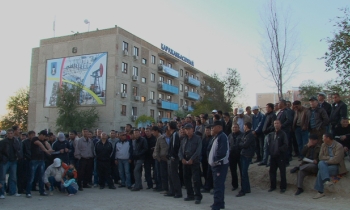The two journalists of the Radio Free Europe / Radio Liberty (RFE/RL) being held incommunicado in Turkmenistan have been handed over a 15-day sentence, the radio has reported quoting Miklos Haraszti, the Organization for Security and Cooperation in Europe (OSCE) Representative on Freedom of the Media.

According to Haraszti, the two journalists – Meret Khommadov and Jumadurdy Ovezov – have been sentenced by an administrative court under Chapter 168 [of Turkmenistan's criminal code] to 15 days of public or community work, and these people were not taken into custody based on their being journalists but on their alleged behaviour at a town hall meeting in the Vekilbazar region of Mary Province on March 7.
"According to the testimonies of people present, they behaved in a hooliganistic way, disrupting the meeting, shouting at officials, cursing at elderly people. That's the official description of what happened. And there were written claims against them filed by one of those elderly people," Haraszti told RFE/RL.
Elaborate details were not available.
Turkmenistan is one of the world's most closed societies, and RFE/RL is considered the only independent source of news and information in the country. Authorities routinely persecute journalists affiliated with the radio service, private citizens who have given interviews to RFE/RL, and relatives and friends of RFE/RL journalists. Most RFE/RL correspondents use pseudonyms to avoid official harassment, which includes threats, detentions, interrogations, surveillance, torture, and imprisonment.
"We're alarmed by Turkmen authorities' actions against our colleagues Khommadov and Ovezov, and we are very concerned that RFE/RL cannot contact its correspondents," Committee to Protect journalists (CPJ) Executive Director Ann Cooper said. "We call on authorities to disclose the whereabouts and all other details concerning Ovezov and Khommadov and to release the journalists immediately. We also call on government officials to halt their campaign of intimidation against RFE/RL journalists and allow them to do their jobs."

International Press Institute (IPI) Director Johann Fritz said, "IPI condemns the lack of information about the journalists' arrest and whereabouts. We call on the authorities to release the journalists and to allow them to continue their work." Fritz added, "We urge the Turkmen authorities to ensure that all journalists have the right to freely report in the country, and to ensure everyone's right "to seek, receive and impart information and ideas through any media and regardless of frontiers" as stated in Article 19 of the Universal Declaration on Human Rights."
The International Helsinki Federation for Human Rights and the Turkmen Initiative for Human Rights released a joint open letter. It said that "as the only remaining source of independent information in the country, RFE/RL journalists are regularly subjected to harassment by the authorities." The letter noted the arrests were not "isolated attacks on freedom of expression and journalists in Turkmenistan."
"The complete absence of information about the reasons and circumstances of the arrests of these journalists is a perfect illustration of the lack of transparency in Turkmenistan," Reporters sans Frontières (RSF) said. "Not only must the press stay silent, but the country itself is closed, No information is allowed to emerge."
"Turkmenistan has a worrying reputation as one of the most oppressive countries in the world," said Oliver Money-Kyrle, the International Federation of Journalists (IFJ) Projects Director for the region. "Government control of media is absolute, arbitrary arrests are common place and independent journalism is not tolerated. In such circumstances we are obviously very fearful when journalists are suddenly detained without any apparent reason."

RFE/RL earlier said its Turkmen service has been unable to contact its other correspondents for 10 days. The Turkmen service relies on half dozen correspondents, who file on an irregular basis from inside the closed country. RFE/RL Acting President Jeff Trimble issued a public appeal, saying its correspondents "are guilty of nothing more than trying to do their jobs as journalists and report the news."
One of those correspondents, Shamurad Akoyliyev, was summoned to the Balkansk branch of the Ministry of National Security (MNB) in late February, when security officers warned him of the "unacceptability" of his affiliation with RFE/RL, the Bulgaria-based Turkmenistan Helsinki Foundation for Human Rights told CPJ. The exact date of the interrogation was not immediately clear, but authorities later cut off Akoyliyev's telephone and the MNB began 24-hour surveillance, the human rights group said. Relatives were pressured to halt communication with Akoyliyev, the group said.
RFE/RL lost contact with Akoyliyev on February 28. Akoyliyev reported from the western Balkansk region, where he primarily covered sports.









